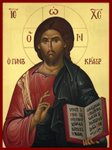Anyway, I thought I might ramble on a bit (and you KNOW how I can do that...wow, I just realized I haven't had the opportunity to ramble on for like 2 MONTHS!!! I am surprised I have lasted this long 8^>).
What has been on my mind for the longest time is the relationship between faith and reason. Moreover, our obligation as Catholics not just to blindly believe and obey but to understand with our intellects. We are supposed to think, apprehend, and comprehend our faith. Faith isn't just believing for believing sake. It is the assent of our mind and will to God's truth.
The Catechism of the Catholic Church:
150 Faith is first of all a personal adherence of man to God. At the same time, and inseparably, it is a free assent to the whole truth that God has revealed. As personal adherence to God and assent to his truth, Christian faith differs from our faith in any human person. It is right and just to entrust oneself wholly to God and to believe absolutely what he says. It would be futile and false to place such faith in a creature.Pope Benedict made this point very clearly at his Regensburg address. He said, "...not to act in accordance with reason is contrary to God's nature." God is infinitely reasonable. We have been led to believe that God can do anything he pleases even to the point of contradicting himself or his nature. This is nonsense. The arbitrary God, which so many believe in, that is a caricature of the true God, is diametrically opposed to the True God who eternally begets the Logos. Pope Benedict stated:
156 What moves us to believe is not the fact that revealed truths appear as true and intelligible in the light of our natural reason: we believe "because of the authority of God himself who reveals them, who can neither deceive nor be deceived". So "that the submission of our faith might nevertheless be in accordance with reason, God willed that external proofs of his Revelation should be joined to the internal helps of the Holy Spirit." Thus the miracles of Christ and the saints, prophecies, the Church's growth and holiness, and her fruitfulness and stability "are the most certain signs of divine Revelation, adapted to the intelligence of all"; they are "motives of credibility" (motiva credibilitatis), which show that the assent of faith is "by no means a blind impulse of the mind".
157 Faith is certain. It is more certain than all human knowledge because it is founded on the very word of God who cannot lie. To be sure, revealed truths can seem obscure to human reason and experience, but "the certainty that the divine light gives is greater than that which the light of natural reason gives." "Ten thousand difficulties do not make one doubt."
158 "Faith seeks understanding": it is intrinsic to faith that a believer desires to know better the One in whom he has put his faith, and to understand better what He has revealed; a more penetrating knowledge will in turn call forth a greater faith, increasingly set afire by love. The grace of faith opens "the eyes of your hearts" to a lively understanding of the contents of Revelation: that is, of the totality of God's plan and the mysteries of faith, of their connection with each other and with Christ, the center of the revealed mystery. "The same Holy Spirit constantly perfects faith by his gifts, so that Revelation may be more and more profoundly understood." In the words of St. Augustine, "I believe, in order to understand; and I understand, the better to believe." (emphasis mine)
At this point, as far as understanding of God and thus the concrete practice of religion is concerned, we are faced with an unavoidable dilemma. Is the conviction that acting unreasonably contradicts God's nature merely a Greek idea, or is it always and intrinsically true? I believe that here we can see the profound harmony between what is Greek in the best sense of the word and the biblical understanding of faith in God. Modifying the first verse of the Book of Genesis, the first verse of the whole Bible, John began the prologue of his Gospel with the words: "In the beginning was the λόγος". Logos means both reason and word - a reason which is creative and capable of self-communication, precisely as reason. John thus spoke the final word on the biblical concept of God, and in this word all the often toilsome and tortuous threads of biblical faith find their culmination and synthesis. In the beginning was the logos, and the logos is God, says the Evangelist.So Christ is not only the eternal Word (λόγος), but it is correct to say that Christ is the eternal Reason (λόγος), in the sense that Christ is eternally proceeds from the intellect of the Father. This doesn't mean that the Second Person of the Blessed Trinity is just a thought in the mind of God. When God imagines himself it becomes the full Image of himself. In other words, this is the eternally begotten Son.
Back to my point...our faith and reason must join. It is no longer acceptable to "just believe". We must begin to come to a deep knowledge of God. Sure, it takes effort, but isn't he worth it? We humans were created for truth. We need it. As we feed our intellect with God's truth it disposes us to love him more. We, as Catholics, must move from a certain fideism (faith without reason). We claim to believe and say that we don't need any reasons...we just do. But is that enough? How do we engage a worldview that is so anti-Christian? How do we explain our beliefs to others? How do we overcome a crisis of faith when challenged with reason? I think there are many Catholics that don't believe God is reasonable; that Christianity is just a blind belief. This is to completely misunderstand faith and the role of our reason in our relationship with God. (See Catechism references above.)
We, as Catholics, have 2000 years of intellectual theological tradition to rely on. We need to dig in and find the beauty of our beliefs and feed our intellects the truth. So how to begin? First, get a Catechism of the Catholic Church and the Compendium, a good Bible, and a couple beginning books on theology. I recommend The Catholic Vision and Theology for Beginners. Of course, to deepen our understanding of God we must commune with God. Thus, prayer is indispensable to theology as it is to our lives.
So....what are you waiting for??.....DIG IN!!



1 comment:
Great post Mike!
I'd also point out that books are not the only way of feeding our minds. There are great video/audio resources as well. Even better... they're free! :-)
Some of my favorite are:
Catholic Answers Live
EWTN
Ave Maria Radio
Praystation Portable
Great stuff.
By the way, if you want to watch/listen to EWTN, but you (like me) believe that Real Media Player is evil... you can use the Real Alternative. If you don't know what that means... don't worry about it. ;->
Post a Comment